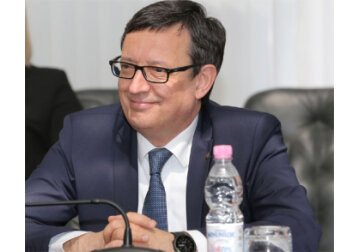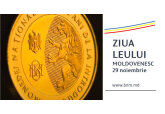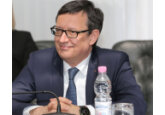
The development of the payment system is an essential component of modernization and increasing the efficiency of the financial sector – the NBM.
Octavian Armasu, Governor of the National Bank of Moldova stated this while speaking at the conference "Alignment with EU payment security standards in the digital era" held in Chisinau. The participants discussed the main developments in the payment systems security field, the best practices for the implementation of payment security measures in the digital environment, as well as the requirements for security and continuity of payments, the benefits, efforts and progress achieved so far within the Twinning Project "Strengthening supervision, corporate governance and risk management in the financial sector of the Republic of Moldova", financed by the European Union. The NBM Governor said that the projects and initiatives launched by the National Bank for the development of payment systems are aimed at offering society a payment system with an efficient infrastructure, as well as modern payment instruments that meet the needs of individual and corporate consumers of payment services. In this context, Octavian Armasu mentioned the system of instant payments and open banking, which are meant to enhance the innovative character of payment services, increase security and introduce new services on the market. Also, the head of the NBM spoke about the project of accession to the SEPA zone, which represents an important step towards opening the borders to the payments market without barriers and will allow Moldovan citizens to make non-cash payments in euros to/from the European area in a much safer, faster and more convenient way. The representative of the Romanian National Bank, Director of the International Relations Department, Serban Matei said that the constant concern of the central banks is to promote the correct functioning of the payment systems and payment instruments, in order to maintain confidence in making cashless payments. He said that the adjustment to the EU standards in the digital era will not only strengthen the confidence in Moldova's financial system, but will also open new opportunities for innovation, efficiency and transparency. He noted that, jointly with a team of experts from the Romanian National Bank, the National Bank of Moldova (NBM) managed to finalize 10 legislative acts, including amendments to the NBM's primary regulatory framework, in order to strengthen the monitoring function of the financial market infrastructures and payment instruments, including the minimum requirements for risk management in the field of information and communication technologies (ICT) and information security. For his part, the program manager of the EU Delegation in Moldova, Josip Juric, said that the alignment with the EU payment security standards will create a reliable basis for ensuring the security of financial transactions and protecting both consumers and businesses from potential threats. This will benefit both the economy and citizens. "We congratulate the National Bank of Moldova on the creation of a new regulatory framework in line with best practices and European standards. This fact is a continuation of the National Bank of Moldova's actions to modernize the financial sector in Moldova," he said. The conference provided an opportunity to present important topics related to payment security, as financial transactions, especially payment transactions, represent an important component of economic relations. At the same time, Moldova's harmonization with EU standards in the field of digital payment security is an important step to strengthen its position in the European and global financial landscape. This fact supports the economic integration of the country and contributes to the creation of a safe, innovative and sustainable financial environment for all parties involved. The official part of the event was followed by a session of presentations by industry experts who shared with the participants best practices in the field of payment security in the digital environment. The event covered the following topics: Instant Payments and Open Banking: managing security risks; New ICT requirements aligned with European practices and standards; Best practices in combating fraud based on social engineering scenarios; Best practices for online payment security; Digitalization and competition in the financial sector: support through legal and infrastructure reforms. Among the participants of the conference were high-ranking officials, representatives of the EU Delegation to Moldova and NBM's partners in the Twinning Project, respectively, the Consortium for its implementation, formed by the National Bank of Romania, the Central Bank of the Netherlands (De Nederlandsche Bank) and the Central Bank of Lithuania (Lietuvos bankas), in cooperation with the Romanian Financial Supervisory Authority and the Romanian National Authority for Consumer Protection. The conference was also attended by representatives of the banking community and payment service providers in Moldova. The aim of the conference was to inform the society, the payment services market and other stakeholders about the main developments in the field of payment transaction security, as well as about the best practices of implementing payment security measures in the digital environment. Twinning is an EU instrument of institutional cooperation between the EU authorities and the authorities of beneficiary countries. Twinning projects aim to develop the institutional capacity of beneficiary authorities. In these projects, experts from the EU public sector are seconded to assist beneficiary authorities to achieve specific objectives. // 07.12.2023 – InfoMarket







